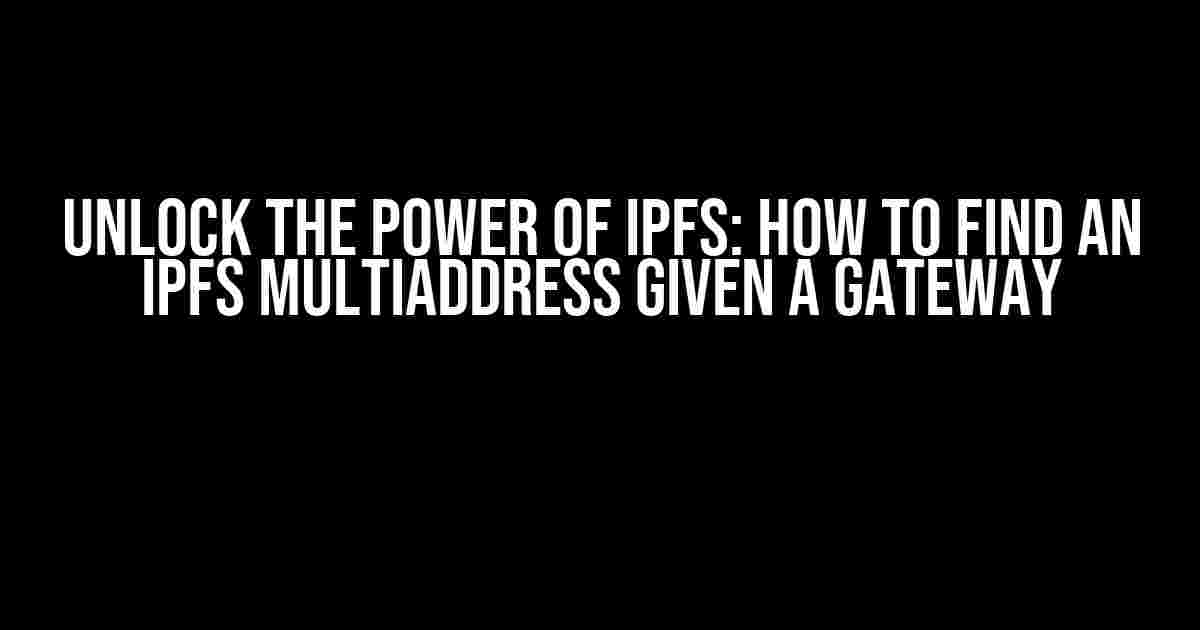Are you ready to take the first step in unleashing the full potential of the InterPlanetary File System (IPFS)? Look no further! In this comprehensive guide, we’ll walk you through the process of finding an IPFS multiaddress given a gateway. Buckle up, because we’re about to dive into the world of decentralized file sharing!
What is an IPFS Multiaddress?
Before we dive into the tutorial, it’s essential to understand what an IPFS multiaddress is. Simply put, a multiaddress is a string that combines multiple addresses, enabling IPFS nodes to communicate with each other efficiently. It’s like having a unique identifier for your node, allowing others to find and connect with you.
/ip4/192.0.2.1/tcp/4001/p2p/QmNodeID
In the example above, the multiaddress consists of:
/ip4/192.0.2.1: The IP address of the node/tcp/4001: The TCP port used for communication/p2p/QmNodeID: The ID of the node, which is a unique identifier
Why Do You Need a Gateway?
A gateway is a node that allows users to access IPFS content from a traditional web browser. It acts as a bridge between the decentralized IPFS network and the traditional web. Without a gateway, you wouldn’t be able to access IPFS content without running a node yourself.
Think of a gateway as a doorway to the IPFS universe. With a gateway, you can access IPFS content without worrying about the underlying complexity of the decentralized network.
How to Find an IPFS Multiaddress Given a Gateway
Now that we’ve covered the basics, let’s get to the good stuff! Here’s a step-by-step guide on how to find an IPFS multiaddress given a gateway:
-
Choose a Gateway
First, select a reliable IPFS gateway. Some popular options include:
-
Use the Gateway’s API
Most gateways provide an API that allows you to query information about the node. We’ll use the API to retrieve the multiaddress.
For example, let’s use the ipfs.io gateway API. You can query the API using the following URL:
https://ipfs.io/api/v0/idThis will return a JSON response containing information about the node, including the multiaddress.
-
Parse the API Response
When you query the API, you’ll receive a JSON response. We’re interested in the
addressesfield, which contains an array of multiaddresses.{ "id": "QmNodeID", "addresses": [ "/ip4/192.0.2.1/tcp/4001/p2p/QmNodeID", "/ip6/2001:0db8:85a3:0000:0000:8a2e:0370:7334/tcp/4001/p2p/QmNodeID", "/dns4/ipfs.io/tcp/4001/p2p/QmNodeID" ] }In this example, we have three multiaddresses. We can use any one of them to connect to the node.
-
Verify the Multiaddress
Before using the multiaddress, it’s essential to verify that it’s correct. You can use the IPFS CLI tool to ping the node using the multiaddress.
ipfs ping /ip4/192.0.2.1/tcp/4001/p2p/QmNodeIDIf the multiaddress is correct, you should see a response indicating that the node is reachable.
Troubleshooting Common Issues
When finding an IPFS multiaddress given a gateway, you might encounter some issues. Here are a few common ones and their solutions:
| Issue | Solution |
|---|---|
| The API returns an error message | Check the gateway’s API documentation to ensure you’re using the correct API endpoint and parameters. |
| The multiaddress is invalid | Verify that the multiaddress is correctly formatted and that you’ve copied it correctly. |
| The node is unreachable | Check the node’s status and ensure it’s online. You can also try using a different gateway or node. |
Conclusion
And there you have it! With these simple steps, you’ve successfully found an IPFS multiaddress given a gateway. You can now use this multiaddress to connect to the node and access IPFS content.
Remember, the world of IPFS is all about decentralization and community-driven development. By understanding how to find and use multiaddresses, you’re one step closer to unlocking the full potential of this revolutionary technology.
Final Thoughts
As you explore the world of IPFS, keep in mind that this is just the beginning. With great power comes great responsibility, and it’s up to us to ensure that this technology is used for the greater good.
So, what are you waiting for? Get out there and start experimenting with IPFS! Share your experiences, ask questions, and contribute to the community. Together, we can create a decentralized future where data is free and accessible to all.
Frequently Asked Question
Get ready to unleash the power of IPFS! Here are the answers to your burning questions about finding an IPFS multiaddress given a gateway.
What is an IPFS multiaddress, and why do I need it?
An IPFS multiaddress is a string that combines multiple addresses and protocols to connect to a peer or node in the InterPlanetary File System (IPFS). You need it to establish a connection with an IPFS node or gateway, allowing you to access or share content on the decentralized network. Without it, you won’t be able to interact with the IPFS ecosystem.
How do I find the IPFS multiaddress of a public gateway?
You can find the IPFS multiaddress of a public gateway by checking the gateway’s documentation or website. Many public gateways, such as ipfs.io or cloudflare-ipfs.com, display their multiaddresses prominently. You can also use tools like the IPFS Commander or IPFS Web Clients to discover and connect to public gateways.
Can I use a DNS link to find an IPFS multiaddress?
Yes, you can use a DNS link to find an IPFS multiaddress. Many IPFS gateways and nodes publish their multiaddresses as DNS TXT records. You can use tools like `dig` or online DNS lookup services to retrieve the multiaddress from the DNS record.
How do I use an IPFS multiaddress to connect to a gateway?
To connect to an IPFS gateway using a multiaddress, you’ll need to use an IPFS client or library that supports multiaddresses. You can then use the multiaddress to establish a connection with the gateway, allowing you to access or share content on the IPFS network.
Are IPFS multiaddresses case-sensitive?
Yes, IPFS multiaddresses are case-sensitive. Make sure to copy and paste the multiaddress exactly as provided, without modifying the case, to ensure a successful connection.

